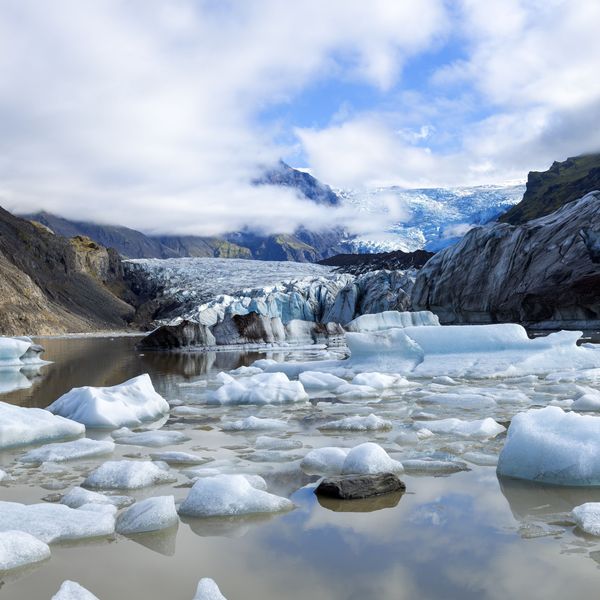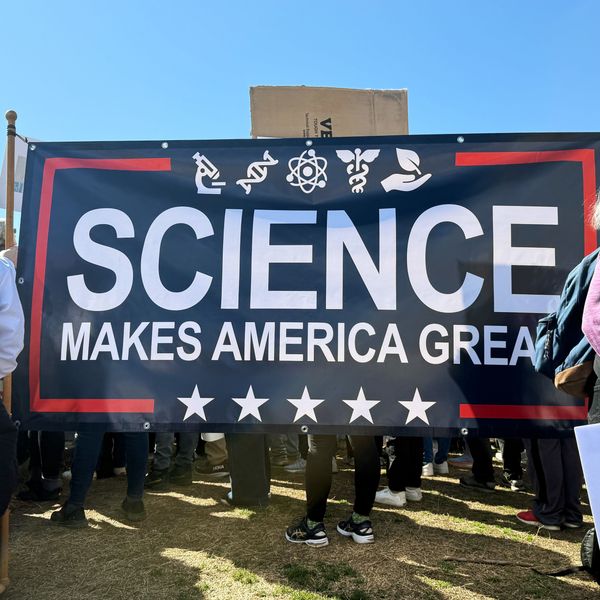Bracing for Trump's Anti-Science Agenda, DOE Announces 'Scientific Integrity Policy'
New standards ensure protections for scientific workforce at Department of Energy
As President-elect Donald Trump's anti-science administration prepares to swoop into Washington, D.C., outgoing Department of Energy (DOE) Secretary Ernest Moniz on Wednesday announced a new "scientific integrity policy" meant to protect workers and policies that may be at risk.
According to Moniz, who announced the policy in a Medium post and at a National Press Club speech, the policy makes clear that:
- Energy Department scientists are able to express their opinions;
- Energy Department scientists must get the opportunity to review department statements about their work; and
- Energy Department officials should not and will not ask scientists to tailor their work to particular conclusions.
"As a scientist and an American, I care deeply about scientific independence and integrity, because they are essential components of the scientific method," Moniz wrote. "Evidence, observation, experiment, and analysis are the appropriate ways to test a hypothesis."
The Verge reports that the policy "also requires the energy secretary--soon to be former Texas governor Rick Perry, who once said he wanted to shut down the department entirely--to appoint an ombudsman for scientific integrity." And the new standards, which apply to contractors as well as DOE employees, allow scientists to publicly state their opinions on science and policy, as long as they make clear that they are not speaking for the government.
Michael Halpern, deputy director at the Union of Concerned Scientists' Center for Science and Democracy, said the policy's "language is strong and precise, giving scientists and science advocates a solid platform to stand on in pushing back against the manipulation and suppression of science and the harassment of scientists."
The Verge reporter Angela Chen writes:
It's important that these new policies have been released before Trump's inauguration. In the months since the November election, Trump has shown that his administration, like the Bush administration, is unlikely to take science seriously. Trump questioned global warming while on the campaign trail and asked the Energy Department for the names of its climate change workers. Trump later backed down, after they refused to comply with the request. Still, there are loopholes that could let him wage war on scientific expertise, and scientists have been scrambling to save government climate data before he is sworn in.
The Senate Energy Committee on Thursday set Perry's confirmation hearing for January 19.
Halpern suggested the committee "use the confirmation process to ensure [Perry] commits to following" the new policy. "Senators should prioritize asking Governor Perry for details on how he plans to implement the new scientific integrity standards," Halpern wrote. "And then they should hold him to those commitments through continued oversight."
He continued: "A few questions I'd ask Governor Perry: Are there any parts of the scientific integrity policy that he would change? What plans does he have to train DOE employees about how to use the new policy? Will he give the ombudsperson the authority to investigate allegations of political interference in science? What kind of public reporting will the department do?"
Outgoing President Barack Obama spoke to the importance of scientific integrity during his farewell address this week.
"Without some common baseline of facts," he said, "without a willingness to admit new information, and concede that your opponent might be making a fair point, and that science and reason matter...then we're going to keep talking past each other, and we'll make common ground and compromise impossible."
An Urgent Message From Our Co-Founder
Dear Common Dreams reader, The U.S. is on a fast track to authoritarianism like nothing I've ever seen. Meanwhile, corporate news outlets are utterly capitulating to Trump, twisting their coverage to avoid drawing his ire while lining up to stuff cash in his pockets. That's why I believe that Common Dreams is doing the best and most consequential reporting that we've ever done. Our small but mighty team is a progressive reporting powerhouse, covering the news every day that the corporate media never will. Our mission has always been simple: To inform. To inspire. And to ignite change for the common good. Now here's the key piece that I want all our readers to understand: None of this would be possible without your financial support. That's not just some fundraising cliche. It's the absolute and literal truth. We don't accept corporate advertising and never will. We don't have a paywall because we don't think people should be blocked from critical news based on their ability to pay. Everything we do is funded by the donations of readers like you. Will you donate now to help power the nonprofit, independent reporting of Common Dreams? Thank you for being a vital member of our community. Together, we can keep independent journalism alive when it’s needed most. - Craig Brown, Co-founder |
As President-elect Donald Trump's anti-science administration prepares to swoop into Washington, D.C., outgoing Department of Energy (DOE) Secretary Ernest Moniz on Wednesday announced a new "scientific integrity policy" meant to protect workers and policies that may be at risk.
According to Moniz, who announced the policy in a Medium post and at a National Press Club speech, the policy makes clear that:
- Energy Department scientists are able to express their opinions;
- Energy Department scientists must get the opportunity to review department statements about their work; and
- Energy Department officials should not and will not ask scientists to tailor their work to particular conclusions.
"As a scientist and an American, I care deeply about scientific independence and integrity, because they are essential components of the scientific method," Moniz wrote. "Evidence, observation, experiment, and analysis are the appropriate ways to test a hypothesis."
The Verge reports that the policy "also requires the energy secretary--soon to be former Texas governor Rick Perry, who once said he wanted to shut down the department entirely--to appoint an ombudsman for scientific integrity." And the new standards, which apply to contractors as well as DOE employees, allow scientists to publicly state their opinions on science and policy, as long as they make clear that they are not speaking for the government.
Michael Halpern, deputy director at the Union of Concerned Scientists' Center for Science and Democracy, said the policy's "language is strong and precise, giving scientists and science advocates a solid platform to stand on in pushing back against the manipulation and suppression of science and the harassment of scientists."
The Verge reporter Angela Chen writes:
It's important that these new policies have been released before Trump's inauguration. In the months since the November election, Trump has shown that his administration, like the Bush administration, is unlikely to take science seriously. Trump questioned global warming while on the campaign trail and asked the Energy Department for the names of its climate change workers. Trump later backed down, after they refused to comply with the request. Still, there are loopholes that could let him wage war on scientific expertise, and scientists have been scrambling to save government climate data before he is sworn in.
The Senate Energy Committee on Thursday set Perry's confirmation hearing for January 19.
Halpern suggested the committee "use the confirmation process to ensure [Perry] commits to following" the new policy. "Senators should prioritize asking Governor Perry for details on how he plans to implement the new scientific integrity standards," Halpern wrote. "And then they should hold him to those commitments through continued oversight."
He continued: "A few questions I'd ask Governor Perry: Are there any parts of the scientific integrity policy that he would change? What plans does he have to train DOE employees about how to use the new policy? Will he give the ombudsperson the authority to investigate allegations of political interference in science? What kind of public reporting will the department do?"
Outgoing President Barack Obama spoke to the importance of scientific integrity during his farewell address this week.
"Without some common baseline of facts," he said, "without a willingness to admit new information, and concede that your opponent might be making a fair point, and that science and reason matter...then we're going to keep talking past each other, and we'll make common ground and compromise impossible."
As President-elect Donald Trump's anti-science administration prepares to swoop into Washington, D.C., outgoing Department of Energy (DOE) Secretary Ernest Moniz on Wednesday announced a new "scientific integrity policy" meant to protect workers and policies that may be at risk.
According to Moniz, who announced the policy in a Medium post and at a National Press Club speech, the policy makes clear that:
- Energy Department scientists are able to express their opinions;
- Energy Department scientists must get the opportunity to review department statements about their work; and
- Energy Department officials should not and will not ask scientists to tailor their work to particular conclusions.
"As a scientist and an American, I care deeply about scientific independence and integrity, because they are essential components of the scientific method," Moniz wrote. "Evidence, observation, experiment, and analysis are the appropriate ways to test a hypothesis."
The Verge reports that the policy "also requires the energy secretary--soon to be former Texas governor Rick Perry, who once said he wanted to shut down the department entirely--to appoint an ombudsman for scientific integrity." And the new standards, which apply to contractors as well as DOE employees, allow scientists to publicly state their opinions on science and policy, as long as they make clear that they are not speaking for the government.
Michael Halpern, deputy director at the Union of Concerned Scientists' Center for Science and Democracy, said the policy's "language is strong and precise, giving scientists and science advocates a solid platform to stand on in pushing back against the manipulation and suppression of science and the harassment of scientists."
The Verge reporter Angela Chen writes:
It's important that these new policies have been released before Trump's inauguration. In the months since the November election, Trump has shown that his administration, like the Bush administration, is unlikely to take science seriously. Trump questioned global warming while on the campaign trail and asked the Energy Department for the names of its climate change workers. Trump later backed down, after they refused to comply with the request. Still, there are loopholes that could let him wage war on scientific expertise, and scientists have been scrambling to save government climate data before he is sworn in.
The Senate Energy Committee on Thursday set Perry's confirmation hearing for January 19.
Halpern suggested the committee "use the confirmation process to ensure [Perry] commits to following" the new policy. "Senators should prioritize asking Governor Perry for details on how he plans to implement the new scientific integrity standards," Halpern wrote. "And then they should hold him to those commitments through continued oversight."
He continued: "A few questions I'd ask Governor Perry: Are there any parts of the scientific integrity policy that he would change? What plans does he have to train DOE employees about how to use the new policy? Will he give the ombudsperson the authority to investigate allegations of political interference in science? What kind of public reporting will the department do?"
Outgoing President Barack Obama spoke to the importance of scientific integrity during his farewell address this week.
"Without some common baseline of facts," he said, "without a willingness to admit new information, and concede that your opponent might be making a fair point, and that science and reason matter...then we're going to keep talking past each other, and we'll make common ground and compromise impossible."

